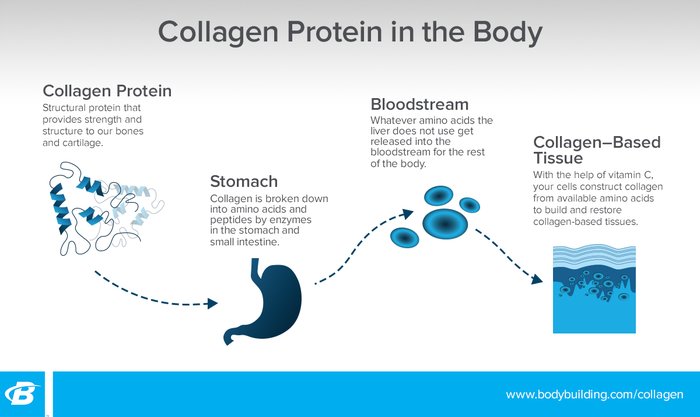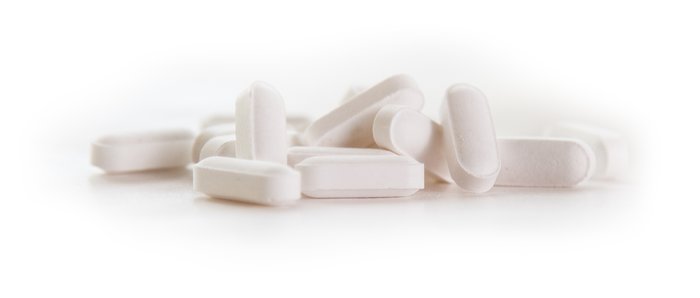You might have heard it thrown around as a buzzword, but what exactly is collagen? Collagen is the chief structural protein that holds our bodies together. It provides resilient elasticity to our skin, hair, ligaments, and tendons, as well as strength and structure to our bones and cartilage. Collagen is made up of many amino acids, primarily glycine, proline, alanine, hydroxyproline, and glutamic acid. Hydrolyzed collagen and collagen peptides are simply smaller pieces of collagen which are easier to digest.
Collagen, like other proteins, is broken down into amino acids by enzymes in the stomach and small intestine. These amino acids then enter the blood stream via the hepatic portal to the liver. Whatever amino acids the liver does not use get released into the bloodstream for the rest of the body. It doesn't matter if you're consuming straight collagen (gelatin) or hydrolyzed collagen (collagen peptides)—they both break down into amino acids, the basic building blocks of all proteins.

Why does this matter? Well, it's not like globs of collagen are floating around your bloodstream, patching holes in your gut lining or lifting your under-eye bags. Instead, what happens is that (with the help of vitamin C), your cells construct collagen from available amino acids. Still, it makes sense that by consuming digestible collagen, you're providing your body with the necessary amino acids to build and restore collagen-based tissues including skin, hair, ligaments, tendons, bones, cartilage.
So, is collagen a health hoax or essential superfood? Let's review the cold, hard facts surrounding these oh-so-popular collagen claims.
Claim: Collagen supplementation improves health of skin, hair, and nails
Consensus: Yes, and maybe. Double-blind, placebo-controlled studies indicate that collagen supplementation can significantly improve skin elasticity and moisture, and even reduce wrinkles![1-3] Hoping for more lustrous locks? A recent study in mice showed that collagen destruction is the chief culprit of age-related hair loss, but more studies are needed to warrant collagen supplementation for hair growth.[4] Evidence is currently lacking on collagen supplementation for growing stronger nails, so you're probably better off protecting your nails with a hardening clear coat.[5]

Claim: Collagen supplementation reduces the appearance of cellulite
Consensus: This is quite promising! A 2015 study showed that long-term supplementation (more than 6 months) with bioactive collagen peptides significantly improved the appearance of cellulite in women of healthy body weight (and, to a lesser extent, in overweight women).[6] It should be noted that collagen creams are not effective. The molecules are too large to be absorbed by the skin.
Claim: Collagen supplementation helps to maintain muscle mass and a healthy body weight
Consensus: Yes—as long as it's in conjunction with a healthy diet and exercise. High-protein diets reign supreme when it comes to maintaining and building lean mass. The more muscle you have, the more calories you burn at rest and during exercise, which makes weight maintenance and fat loss much easier. High-protein diets also help suppress appetite, which means you're less likely to cheat!
Being a protein, collagen contributes to total protein intake, and has been shown to be helpful for maintaining muscle mass, particularly in the elderly.[7,8] The only drawback is that collagen is not particularly high in leucine, the primary amino acid responsible for initiating muscle protein synthesis (or muscle growth). So, don't rely on collagen for all of your daily protein needs—choose a variety of quality protein sources.

Claim: Collagen supplementation protects cardiovascular and liver health
Consensus: Probably not. Available studies show benefits of specific amino acids in collagen, but not collagen itself. For example, collagen contains the amino acids arginine and glycine, both of which are suggested agents for liver detoxification.
The Verdict
So, are collagen supplements worth the investment? That depends on your goal. Collagen supplements appear to be effective for improving skin elasticity, reducing wrinkles, and minimizing the appearance of cellulite. Research also supports their use for reducing joint pain, stiffness, and degeneration. However, the evidence is not convincing for collagen supplements when it comes to treating hair loss, brittle nails, osteoporosis, periodontitis, gastrointestinal disorders, heart disease, and liver disease.
To see the benefits of collagen peptides, you need 2.5 grams daily. The rest of your protein should come from quality sources such as grass-fed beef, free-range poultry and eggs, lean pork raised without hormones, wild-caught salmon, and other low-mercury fish and seafood. Vegans should choose minimally-processed soy products, beans, peas, lentils, and whole grains.
References
- Proksch, E., Segger, D., Degwert, J., Schunck, M., Zague, V., & Oesser, S. (2014). Oral supplementation of specific collagen peptides has beneficial effects on human skin physiology: a double-blind, placebo-controlled study. Skin Pharmacology and Physiology, 27(1), 47-55.
- Asserin, J., Lati, E., Shioya, T., & Prawitt, J. (2015). The effect of oral collagen peptide supplementation on skin moisture and the dermal collagen network: evidence from an ex vivo model and randomized, placebo‐controlled clinical trials. Journal of Cosmetic Dermatology, 14(4), 291-301.
- Proksch, E., Schunck, M., Zague, V., Segger, D., Degwert, J., & Oesser, S. (2014). Oral intake of specific bioactive collagen peptides reduces skin wrinkles and increases dermal matrix synthesis. Skin Pharmacology and Physiology, 27(3), 113-119.
- Matsumura, H., Mohri, Y., Morinaga, H., Fukuda, M., Kurata, S., & Nishimura, E. K. (2017). Hair follicle aging is driven by transepidermal elimination of stem cells via COL17A1 proteolysis. Journal of Dermatological Science, 86(2), e53.
- Seshadri, D., & De, D. (2012). Nails in nutritional deficiencies. Indian Journal of Dermatology, Venereology, and Leprology, 78(3), 237.
- Schunck, M., Zague, V., Oesser, S., & Proksch, E. (2015). Dietary supplementation with specific collagen peptides has a body mass index-dependent beneficial effect on cellulite morphology. Journal of Medicinal Food, 18(12), 1340-1348.
- Hays, N. P., Kim, H., Wells, A. M., Kajkenova, O., & Evans, W. J. (2009). Effects of whey and fortified collagen hydrolysate protein supplements on nitrogen balance and body composition in older women. Journal of the American Dietetic Association, 109(6), 1082-1087.
- Zdzieblik, D., Oesser, S., Baumstark, M. W., Gollhofer, A., & König, D. (2015). Collagen peptide supplementation in combination with resistance training improves body composition and increases muscle strength in elderly sarcopenic men: a randomised controlled trial. British Journal of Nutrition, 114(08), 1237-1245.

